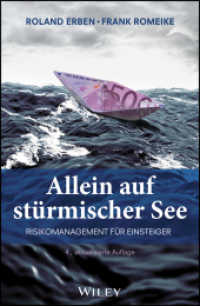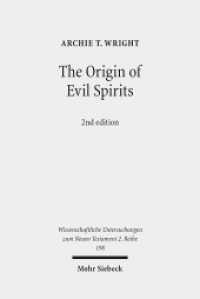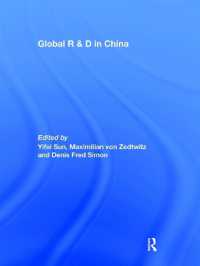- ホーム
- > 洋書
- > 英文書
- > Literary Criticism
Full Description
This insightful book assembles a great variety of contributions on the literature and culture of the Holocaust since 1989. Focusing on Poland, the Czech Republic, and Germany, what becomes apparent is that the Nazi genocide continues to be a pivotal issue in literature, theatre, and film. Including overviews of the literary and cultural developments of the last decades, the chapters cover a wide variety of authors of both the older and younger generation such as Ruth Kluger, Roma Ligocka, Leon Weliczker, Andrzej Bart, Marek Bienczyk, and Magdalena Tulli. The growing use of provocative and taboo-breaking forms of expression turns out to be an important instrument in keeping alive the memory of the horrible events in the collective memory.
Contents
Vorwort, by Reinhard Ibler Entwicklungen und Trends Die Geister der Vergangenheit. Trauma und Psychoanalyse in der polnischen Gegenwartskunst und -literatur, by Anja Golebiowski Kinder und Enkel des Holocaust erzahlen. Neue Perspektiven in der polnischen Holocaustliteratur, by Hans-Christian Trepte Fiktionalisierung und Dokumentation: Die Shoah im deutschsprachigen Gegenwartsdrama, by Markus Roth Representations of the Holocaust in Recent Youth Literature, by Katharina Bauer Vergleichende Studien Weiter leben - weiter schreiben: Ruth Klugers Still Alive. A Holocaust Girlhood Remembered und Imre Kertesz' Dossier K. Eine Ermittlung im Vergleich, by Marija Sruk Das Getto ?od?/Litzmannstadt in fiktionalen Texten. Ein Versuch, by Sascha Feuchert Das Bild des ?od?er Gettos in der Literatur im 21. Jahrhundert. Rezeption in Polen, by Krystyna Radziszewska The Holocaust - Postmemory - Postmodern Novel: The Flytrap Factory by Andrzej Bart, Tworki by Marek Bie?czyk and Skaza by Magdalena Tulli, by Agnieszka Izdebska and Danuta Szajnert Holocaust und KZ im Fokus tschechischer Literatur nach 2000. Zu Arnost Goldflams Doma u Hitler? und Radka Denemarkovas Penize od Hitlera, by Wolfgang F. Schwarz Spate Zeugnisse der Erlebnisgeneration Literature of the Holocaust and Genre Theory (on Leon Weliczker's Book Brygada ?mierci), by Grzegorz Gazda Trauma-Verarbeitung in Das Madchen im roten Mantel und Dobre dziecko (Gutes Kind) von Roma Ligocka, by Aleksandra Bak-Zawalski Ota B. Kraus's Life and his Novel M?j bratr dym (The Painted Wall), by Hana Hribkova Family - an Unpredictable Joke: Milan Uhde's Family Plays, by Filip Tomas Die Generation der Kinder und Enkel Willy Mahler's Theresienstadt Diary and Arnost Goldflam's Play Sweet Theresienstadt (Sladky Theresienstadt), by Jiri Holy Zwischen Traumidylle und realem Horror: Zur Darstellung des Holocaust in Arnost Goldflams Drama Sladky Theresienstadt (1996), by Reinhard Ibler Another Way to Remember: Jachym Topol's Works Sestra (1994) and Chladnou zemi (2009) in the Context of Czech Cultural Memory of the Holocaust, by Valentina Kaptayn Biological and Other Ways of Surviving the Shoah in Irena Douskova's Work, by Stepan Balik Trauma in Denemarkovas Buch Penize od Hitlera, by Tereza Tomasova Holocaust und Indien: Zu Hana Andronikovas Roman Zvuk slunecnich hodin, by Olga Zitova Outrageous Taboo Breaking or Ingenious Narrative Strategy? About Zyta Rudzka's Slicznotka doktora Josefa and its Perception in German and Polish Reviews, by Elisa-Maria Hiemer The Tale of Sir Nicholas Winton in Matej Minac's Movies Nicky's Family and The Power of Good, by Sarka Vlasakova Szpera '42 - Theater im Raum der Geschichte, by Malgorzata Leyko Personenverzeichnis








